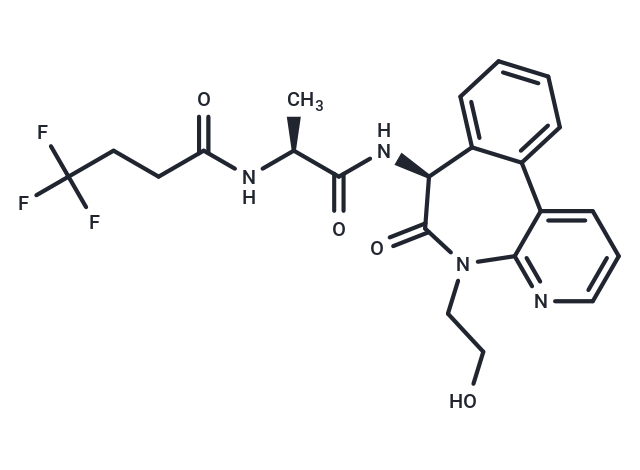Shopping Cart
- Remove All
 Your shopping cart is currently empty
Your shopping cart is currently empty

Crenigacestat (LY3039478) is an orally bioavailable Notch inhibitor with an IC50 of ~1 nM in most tumor cell lines tested. It effectively inhibits mutant Notch receptor activity and, in a xenograft tumor model, inhibits the expression of Notch-regulated genes and N1ICD cleavage in the tumor microenvironment.

| Pack Size | Price | Availability | Quantity |
|---|---|---|---|
| 1 mg | $56 | In Stock | |
| 5 mg | $122 | In Stock | |
| 10 mg | $198 | In Stock | |
| 25 mg | $372 | In Stock | |
| 50 mg | Inquiry | In Stock | |
| 1 mL x 10 mM (in DMSO) | $123 | In Stock |
| Description | Crenigacestat (LY3039478) is an orally bioavailable Notch inhibitor with an IC50 of ~1 nM in most tumor cell lines tested. It effectively inhibits mutant Notch receptor activity and, in a xenograft tumor model, inhibits the expression of Notch-regulated genes and N1ICD cleavage in the tumor microenvironment. |
| Targets&IC50 | Notch1:1 nM |
| In vitro | Crenigacestat is a novel small molecule that is an exquisitely potent inhibitor of Notch-1 intracellular domain (N1ICD) cleavage with an IC50 of ~1 nM in most of the tumor cell lines tested. Crenigacestat also potently inhibits mutant Notch receptor activity[2]. Treatment with a gamma secretase inhibitor, Crenigacestat, significantly inhibited the growth of 2 CCRCC(Clear cell renal cell carcinoma) cell lines in a concentration dependent manner. Crenigacestat treatment also led to decreased expression of Myc and Cyclin A1, two genes that were part of the NOTCH driven proliferative signature in murine and human model systems. Crenigacestat treatment also led to G0/G1 cell cycle arrest in CCRCC cells[3]. |
| In vivo | In mice, its oral bioavalability(%F) is 65%, clearance(CL)=41 mL/min/kg, VDss = 3.8 L/kg. In Rats, its oral bioavalability(%F) is 65%, CL=98 mL/min/kg, VDss=4.9 L/kg. In Dogs, its oral bioavalability (%F) is 67%, CL=3.8 mL/min/kg, VDss=1.4 L/kg[1]. In a xenograft tumor model, Crenigacestat inhibited N1ICD cleavage and expression of Notch-regulated genes in the tumor microenvironment. The inhibition of Notch cleavage also resulted in the induction of apoptosis in a Notch-dependent xenograft model[2]. In immunodeficient NSG mice xenografted with 769-P CCRCC cells, Crenigacestat treatment resulted in significantly increased survival and delayed tumor growth in independent cohorts of mice demonstrating in vivo efficacy in CCRCC[3]. |
| Cell Research | K07074 cells were plated to 24-well plates at 10<sup>5</sup> cell/well. Viability of cells was assessed in quadruplicates at indicated timepoints using the CellTiter-Glo luminescent cell viability assay. To study the effect of the small molecular compounds on K07074 cell growth the compounds or DMSO were added to the growth media 24 h after seeding. The cells were incubated with inhibitors and DMSO as indicated. Cell viability was assessed as described above. Each experiment was carried out in triplicate and at least 3 independent experiments were performed. (Only for Reference) |
| Alias | LY3039478 |
| Molecular Weight | 464.44 |
| Formula | C22H23F3N4O4 |
| Cas No. | 1421438-81-4 |
| Smiles | C[C@H](NC(=O)CCC(F)(F)F)C(=O)N[C@H]1c2ccccc2-c2cccnc2N(CCO)C1=O |
| Relative Density. | 1.41 g/cm3 (Predicted) |
| Storage | Powder: -20°C for 3 years | In solvent: -80°C for 1 year | Shipping with blue ice. | |||||||||||||||||||||||||||||||||||
| Solubility Information | DMSO: 55 mg/mL (118.42 mM), Sonication is recommended. H2O: < 1 mg/mL (insoluble or slightly soluble) | |||||||||||||||||||||||||||||||||||
Solution Preparation Table | ||||||||||||||||||||||||||||||||||||
DMSO
| ||||||||||||||||||||||||||||||||||||

Copyright © 2015-2025 TargetMol Chemicals Inc. All Rights Reserved.